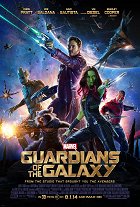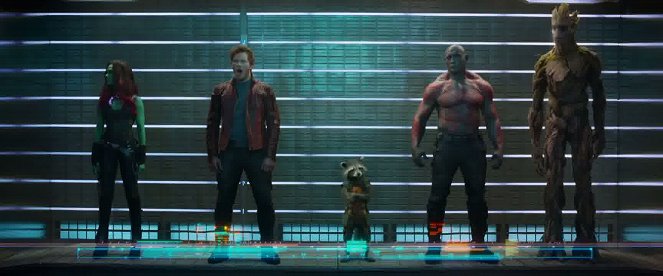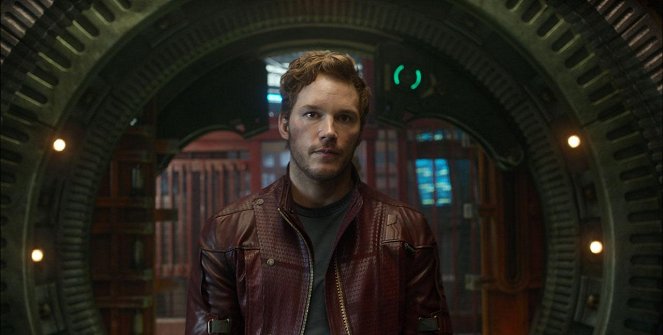Directed by:
James GunnCinematography:
Ben DavisCast:
Chris Pratt, Zoe Saldana, Dave Bautista, Vin Diesel, Bradley Cooper, Lee Pace, Michael Rooker, Karen Gillan, Djimon Hounsou, John C. Reilly, Glenn Close (more)VOD (4)
Plots(1)
Marvel's Guardians of the Galaxy finds space adventurer Peter Quill the object of a bounty hunt after stealing an orb coveted by a treacherous villain, but when Quill discovers the power it holds, he must find a way to rally the quartet of ragtag rivals hot on his trail to save the universe. (Walt Disney US)
Videos (25)
Reviews (18)
At first, I thought: another Marvel movie that’ll get lost in the mix. Then I read some enticing articles about it and slowly but surely, I was beginning to inconspicuously change my opinion of it. In the end, I was only truly convinced at the moment when I watched the movie at a cinema. This Marvel movie isn’t mediocre at all and most importantly, it’s different from all the other superheroes they keep shoving down our throats all the time. It takes place in space, it has a bunch of alien races, a talking raccoon and an overgrown tree. It’s fun, amusing and it has an amazing CGI that makes you feel like you’re in space with them. Plus, it offers Dave Bautista, a wrestler whose door to Hollywood was forever opened by this movie, in my opinion. And I’d love to see him again. All of these points are connected by originality and humor that has managed to tell this two-hour story with ease. And I wouldn’t have guessed that length at the cinema, not even after twenty minutes of contemplating. It was amazing! I’m just so pleasantly surprised and I can’t wait for the sequel.
()
Guardians of the Galaxy take advantage of the fact that people love galactic soap operas and don’t worry about the rest, and it is given to them because they belong to the Marvel universe. In other words, one thing is not true of this film: it really is not subversive. The film always smirks slightly at the right time, but that doesn't change the fact that it takes full advantage of the potential of cosmic heroic sagas and Marvel hubs. Its humor is similarly superficial as the choice of 70's musical hits, but it works as a well-trodden galactic sitcom with excellent characters, and even in serious moments it seriously entices as a "superhero" spectacle (it got to me 2 times with the pure essence of heroic pathos, only to then laugh at myself along with the heroes). It's touchingly childish, yet very adult self-aware. And calculated to the last detail. When it comes to Marvel films, they simply know. Years ahead of the competition. [75%]
()
Guardians of the Galaxy is terribly silly – a multifarious group of sociopaths race to find a silver orb in order to prevent cosmic genocide – but it’s also hard to resist. It is a heroic interplanetary adventure mixed with an ironic B-movie space opera that is nevertheless more serious and less bizarre than you would expect from a former Troma collaborator (Gunn is the co-author of the screenplay for Tromeo and Juliet and the book All I Need to Know About Filmmaking I Learned from the Toxic Avenger). ___ It’s rather unlikely that such a disparate group would come together, so we spend the whole film being persuaded that they can actually work together as a team. The development of the characters is limited to the transformation of hard-headed individualists into team players, which is skilfully incorporated into the main storyline – the plan has to be changed on the fly multiple times because the characters dumbly pursue their own objectives and complicate or delay the achievement of the main goal (Groot in prison, Drax on Knowhere). The film rather straightforwardly focuses on a group of outsiders being accepted by the system (which is dialectically represented by the peace-loving democratic planet Xandar and the Nova Corps military organisation), finding kindred spirits and becoming members of a notional new family (a large, live tree becomes its symbol in probably the most sentimental scene of the film). ___ However, it’s also essentially true that the deeper you go beneath the surface of the film, the more likely you are to be disappointed. The action scenes are spectacular, quite well arranged and sufficiently funny, but they don’t always serve the narrative. For example, the struggle after the first attempt to sell the orb didn’t have to happen at all or could have taken just a few tens of seconds and the impact on the main storyline would have been the same. Furthermore, the formula of “intergalactic terrorist wants to destroy/dominate the universe using a super-powerful artifact (which is nothing more than a MacGuffin)” is already rather worn out and the film doesn’t manage to overcome its clichéd nature quite as effectively as, for example, Iron Man 3 did. ___ On the other hand, it’s been a long time since I’ve seen a blockbuster that was such a joy to watch for its visual aspect alone – and often only for that. Whereas the plot, an Oedipal narrative in its most traditional form, is strikingly reminiscent of A New Hope (a young man growing up without his parents and whose father turns out to be a rather dark character is drawn into an adventure in which millions of lives are at stake) and cheap Star Wars imitations like Battle Beyond the Stars, The Ice Pirates and The Last Starfighter (whose posters obviously inspired the Guardians of the Galaxy poster), the visual creativity of the artists was clearly inspired by the kitschy scenography of the new Star Wars trilogy, the dark visions of H.R. Giger (a planet in a huge head) and the camp aesthetics of Flash Gordon. ___ In addition to the breathtaking visuals, which we can thoroughly enjoy thanks to the longer shots and the large number of deeply composed scenes and half-scenes (which, among other things, serve to illustrate the motif of team cohesion, or lack thereof), Guardians of the Galaxy is notable for its parallel targeting at multiple age groups. Unlike other self-conscious genre pastiches, it doesn’t offer greater pleasure only for those viewers who are familiar with the various fictional worlds (Star Trek, Godzilla, Django), but also for viewers who are familiar with various frames of reference, particularly the present day and the 1980s in this case. Quill represents this duality in the diegesis. On the one hand, he easily fits in among contemporary nerdy heroes with their own system of values that is not derived from authorities, who care more about their technological toys (Walkman, mask) than about living beings and are walking encyclopaedias of pop culture. On the other hand, Quill is also a child of the ’80s, which is evident not only in the objects on his instrument panel (an old cassette recorder, a troll doll, an ALF sticker), but also in most of the films that he quotes from (Footloose, Raiders of the Lost Ark, Howard the Duck). The music that he listens to (naturally on a Walkman from the ’80s), which his absent mother recorded for him and which repeatedly interferes with the development of the narrative, can also be understood as a reminder of the period of his childhood, i.e. the ‘80s. If the 1980s, understood as a period of return to conservative values, serve as a model for the hero’s actions and thinking, this is a variation on the formula of Back to the Future, in which the ’80s had to be “corrected” according to the model of the innocent 1950s. What is implied by all of today’s looking back to the values represented by Reagan’s America of the 1980s? I’d prefer to let others answer that, but I don’t have a very good feeling about it. 80%
()
(less)
(more)
An unforgivable waste of potential. The most entertaining (because it’s the most crackpot, most absurd and the biggest sneer at classic superhero team movies) Marvel squad movie whose wings have been clipped by being grafted onto the standard template of an endless stream of Marvel movies “putting our money only on the tried and tested"; this time dressed up as a space opera with shamefully unremarkable action. Although they should have chosen a rather more revolutionary approach to the material. Maybe some time in the future; maybe with that already cult character from the post-credits scene.
()
The movie’s characters are a bunch of unconventional heroes with believable team chemistry, who do not take themselves too seriously and are played with gusto. Chris Pratt, whose star is on the rise, is a super cool guy, Zoe Saldana would be sexy in any color and Groot is too cute for words. The plot is a total cliché, but the relaxed mood of the film, which shows that nothing is meant seriously, makes that fact less grating. However, I was unpleasantly surprised by the lameness of most of the jokes. Hilarious, imaginative catchphrases with a lot of pop-culture references, were supposed to be the main attraction of the film, and there are almost none of those. Even Seth MacFarlane had more in his recent, rather inane A Million Ways to Die in the West. The crucial scene is foiled by Tyler Bates’ inability to compose an escalating melodic musical theme. The technical aspect is, however, perfect.
()



Ads